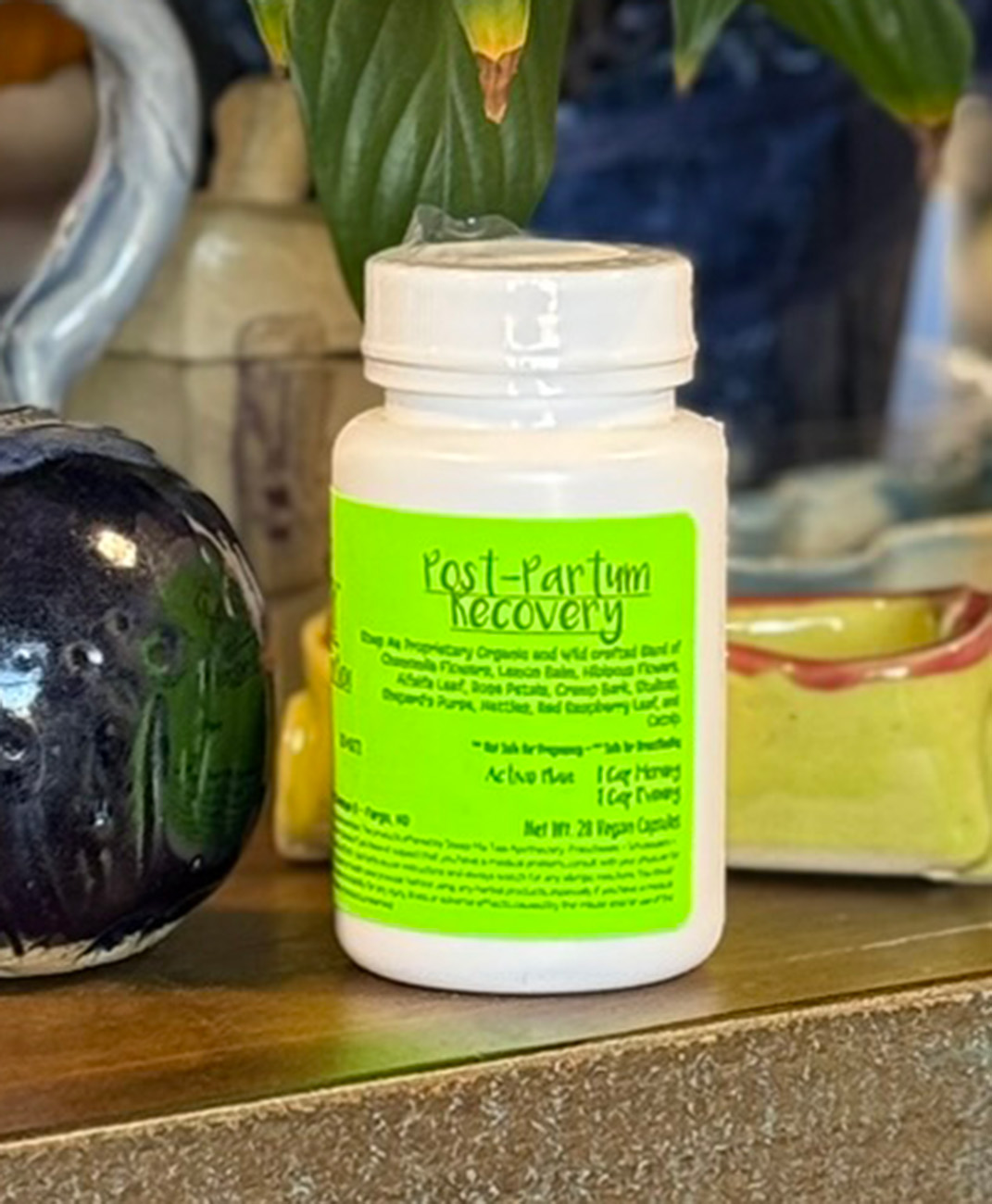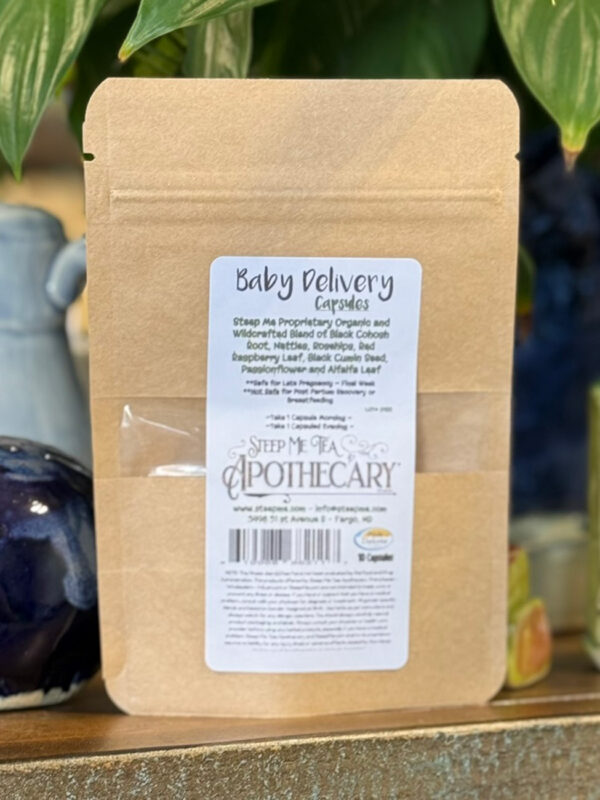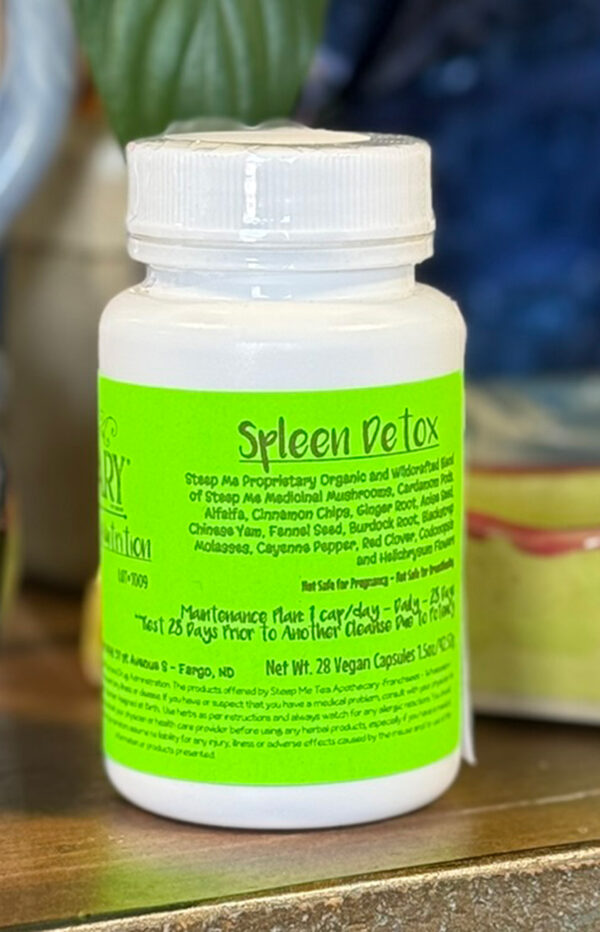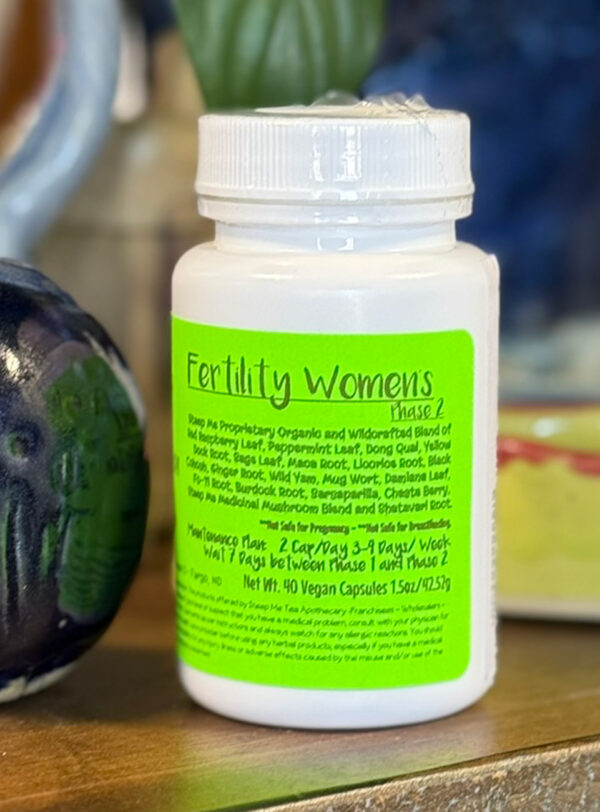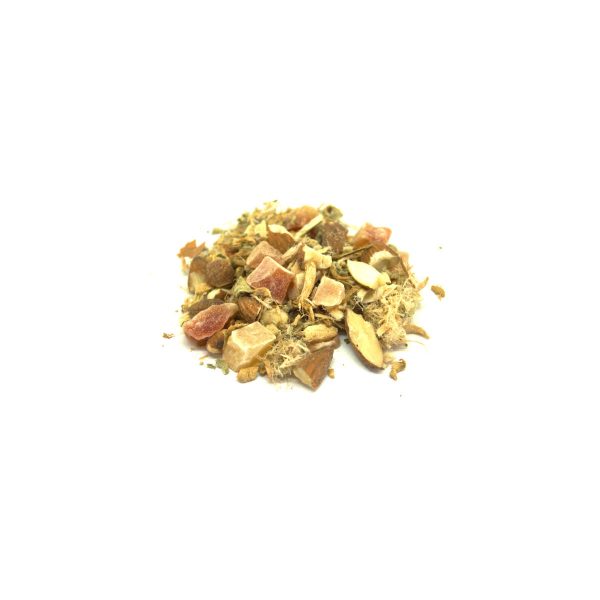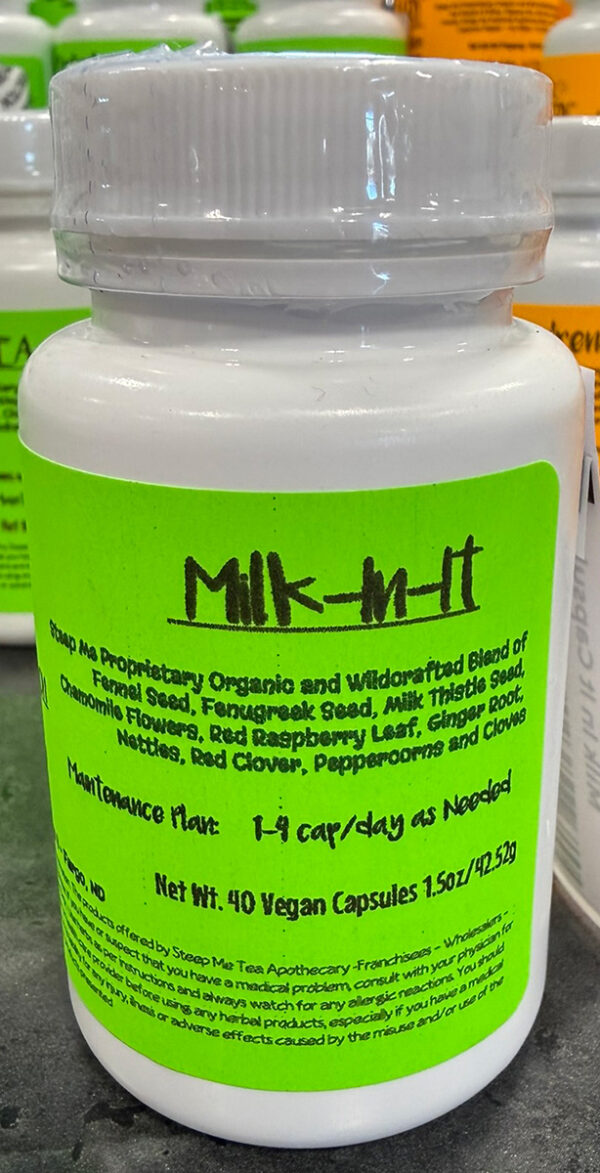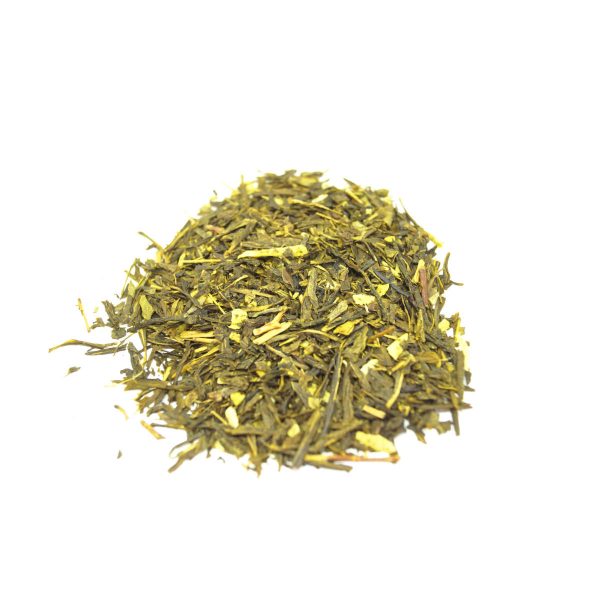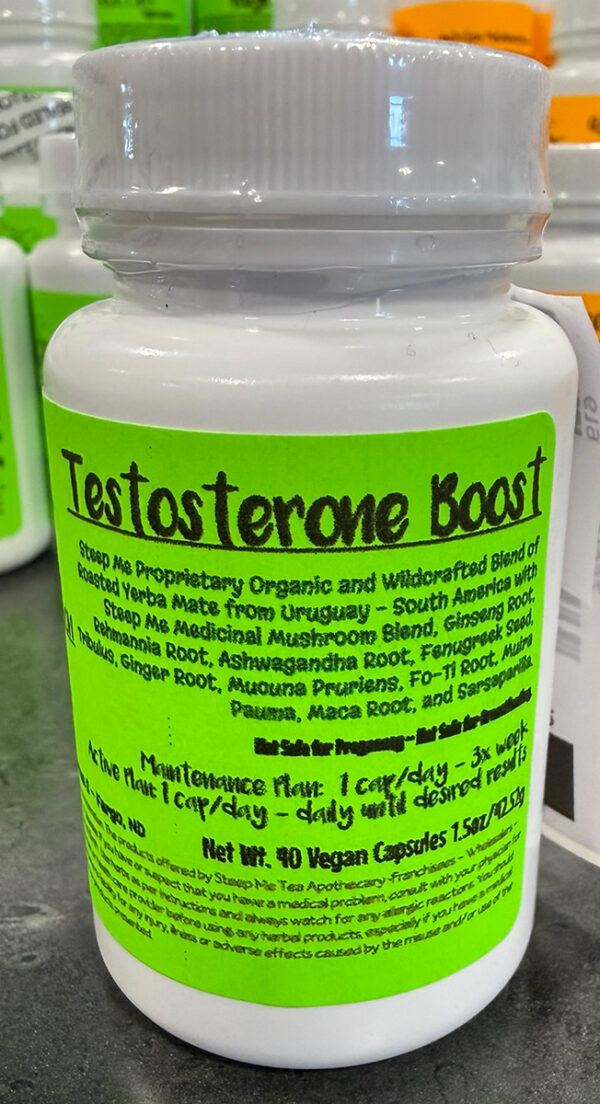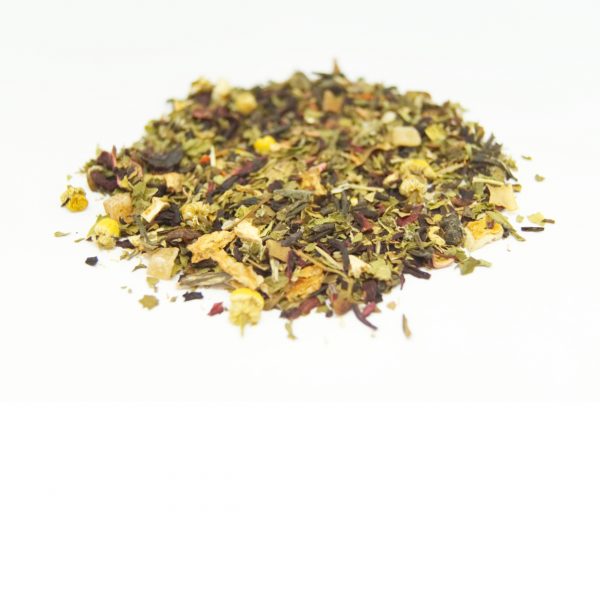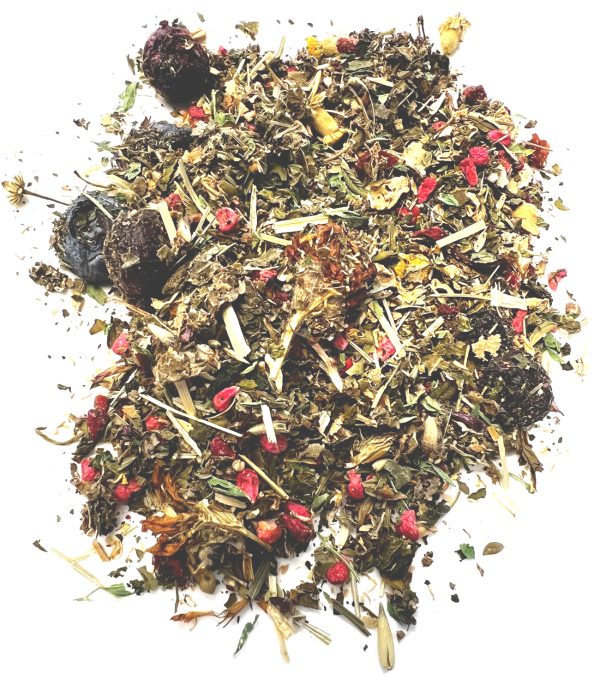With over 400 different kinds of loose tea that will exceed all tea lover’s expectations. You’re sure to find something you will love! All handcrafted by us in North Dakota.
Postpartum Recovery
$41.95
Great 14 Day Recovery Supplement for New Moms!
SKU:
Post Partum Recovery Capsule
Categories: Capsules, Fertility to 4th Trimester
Description
Blender’s Notes Postpartum Recovery:
Steep Me Self Help combinations are a fantastic way to get health benefits outside of the standard tea leaf. This combination of herbs was combined to help the New Mommy during her next 14 Days Recover and start her on the road to feeling better in her new normal. These herbs have been done in a Vegan Capsule making them quick and convenient while learning the new landscape with a newborn baby. These recovery capsules will help with Bottom Recovery, Blood Clotting-Spotting, Pain Management, Hormone Balance, Calming the Mind, Cramping and Uterus Healing. We recommend you take the capsules 2 times a day, morning and night and see how you feel after 14 Days. Some of our new Moms have added in a second round of this recovery especially if spotting continues or wanting an extra round of recovery herbs.
Your recovery — like your pregnancy — is unique to you. There is not a one-size-fits-all timeline to postpartum. But there is a general timeline of what you can expect. Some of the things you can expect in the hours and days immediately after birth are: Your uterus needs to shrink back to its usual size. This causes cramps and vaginal bleeding. Your provider may even massage your uterus through your belly to help it get smaller. Hormonal shifts. This can cause symptoms like hot flashes, changes to your mood and headaches. Breast engorgement. Your breasts will produce milk, and even if you choose not to breastfeed, you will have painful and swollen breasts. Perineal soreness. It is normal to have pain in the space between your vagina and anus (butthole) if you gave birth vaginally. Up to 70% of people have some degree of vaginal tearing during childbirth. People who have a C-section will feel extra sore around the incision site for a few days. Swelling from extra fluids. This is typically normal and your body’s way of getting rid of fluid you accumulate during pregnancy. Your swelling should go down within a week. When swelling comes with symptoms like chest pain and trouble breathing, it could be a sign of something more serious. Fatigue. Labor, childbirth and caring for a newborn may introduce you to a new level of exhaustion. Feeling tired for the days and weeks after you give birth is very normal. Trying to rest as much as you can whenever possible will help you feel better. What are the three stages of postpartum? Postpartum can be categorized into three phases: the acute phase, the subacute phase, and the delayed phase. Acute phase: This is the first six to 12 hours after you give birth. You are most likely to experience conditions like eclampsia, postpartum hemorrhage, and certain medical emergencies during this time. Your care will include things like your provider monitoring your blood pressure, heart rate and bleeding, and checking you for excess swelling. Subacute phase: This phase begins around 24 hours after birth and lasts for about two to six weeks. Your body is still changing, but you are less likely to experience a medical emergency. Some of the concerns your provider may have during this period include cardiomyopathy, postpartum depression and symptoms related to urinary incontinence. Delayed phase: This phase lasts from about six weeks postpartum until six months postpartum. Changes during this phase are gradual and consist of your muscles and tissues returning to their pre-pregnancy state. Your healthcare provider may treat you for conditions like pelvic floor dysfunction, painful sex and uterine prolapse in the delayed phase.
What are normal symptoms of postpartum? You go through significant changes in the postpartum period. A lot of them happen naturally due to hormone changes. Symptoms can be physical, emotional or a combination of both. Physical symptoms Physical symptoms in the postpartum affect your body — things like what it does, what it looks like and how it feels. Some of the most common physical symptoms in postpartum are Soreness and pain in your perineum: Your perineum is the space between your vagina and anus. This area stretches, and sometimes tears, during vaginal childbirth. Your entire perineal area may be sore, swollen and tender for weeks after childbirth. Sitting on a pillow, squirting warm water to rinse the area, and using a cold sanitary pad are ways to help with this discomfort. Vaginal discharge: Lochia is the name for the vaginal bleeding you will have after giving birth (even if you had a C-section). It begins red and tapers off to brown before it ends as a light brown discharge. This entire process can last up to six weeks. Remember, wear a pad to catch vaginal bleeding after childbirth (no tampons). Uterus involution: This is the medical term for your uterus shrinking back to its pre-pregnancy size. The entire process can take up to six weeks, but it begins almost immediately after your baby is born. You can also expect to feel afterbirth pains (or strong cramps) while this happens. Most of the intense pains go away after a few days, but they can also feel more intense during breastfeeding. Breast engorgement and nipple pain: You can expect swollen and painful breasts for at least a few days or longer (if you breastfeed). Some people need the help of a lactation consultant to help with painful symptoms of breastfeeding like cracked nipples. Sweating: Your hormones shift dramatically almost immediately after you give birth. It is common to sweat more, especially at night. It is a normal symptom that should subside within a week or two. Constipation: Being unable to poop after childbirth is a normal symptom in the postpartum period. If you had an epidural, this could slow down your bowels and make it harder to poop. Sometimes, the fear of pushing to poop leads to constipation. Some healthcare providers recommend stool softeners after you give birth to help. Hemorrhoids are also common in the postpartum period. C-section recovery: If you have stitches due to a C-section, your skin will take up to 10 days to heal. The deeper stitches can take up to 12 weeks to heal completely. Watch for signs of infection like pus seeping from the incision or having a fever. Hair loss: Losing your hair is a common occurrence in the postpartum period, mostly due to hormones. Emotional symptoms: Emotional symptoms in the weeks and months after childbirth involve anything that affects your mind, your stress level, or your body image. Baby blues: Baby blues is feeling sad and teary after giving birth. While these new feelings can take you by surprise, they tend to go away after a few weeks. Postpartum depression: This is a type of depression that causes extreme sadness and despair in the weeks and months after childbirth. Unlike the baby blues, this does not go away and often involves treatment with medication or behavioral therapy. Postpartum anxiety: Excessive worrying that occurs after having a baby is called postpartum anxiety. It can be accompanied by physical symptoms like losing sleep or heart palpitations. Postpartum depression and postpartum anxiety can often come together. Treatment for postpartum anxiety can also involve medication or behavioral therapy. Weight loss: Your body went through lots of changes during pregnancy and childbirth. It is common to have loose skin and stretch marks, and stress about extra weight around your hips or belly. Try to relax and give yourself time to recover. You will lose between 10 and 20 pounds before you leave the hospital. Focus on eating nutritious foods and taking care of yourself. Remember that your body has just been through a lot. Postpartum: Stages, Symptoms & Recovery Time (clevelandclinic.org)
Chamomile is known for its calming properties, making it an excellent choice for new mothers dealing with stress or anxiety. Chamomile can help promote relaxation and support a healthy sleep routine during the postpartum period. Chamomile can create a soothing ritual that promotes emotional well-being and wonderful before bedtime and it is also good for the digestive tract too! It is a great mental support essential for postpartum recovery. Lemon balm was also included because it is known for its calming effects and may help reduce anxiety and promote relaxation. Postpartum mothers can benefit from the soothing properties of lemon balm tea, helping to ease stress and improve sleep quality. Hibiscus was added because of its high vitamin C content, and it can be a refreshing and immune-boosting beverage for postpartum mothers who want to feel good, keep their immune systems strong, and protect their delicate baby in the process. It is also known for its potential to help with high blood pressure. Next, we added Alfalfa. Alfalfa is rich in essential vitamins and minerals like calcium, iron, potassium, magnesium, vitamin E, Vitamin C and Vitamin K1. These nutrients can support uterine health, boost energy levels, and enhance milk production for breastfeeding mothers. Rose can have a calming and uplifting aroma, making them a delightful addition to postpartum rituals. In addition to their aromatic benefits, rose petals are known for their mild astringency, which can be soothing for the skin.
The antispasmodic action of cramp bark is beneficial for women who have gone through childbirth. The herb helps reduce muscle tension without inhibiting muscle function. It also relieves after-birth cramps and regulates heavy bleeding, preventing excessive blood loss. Next, we added Skullcap. Skullcap is another herb in the nervine category. This herb helps to decrease stress and anxiety and helps with sleep issues, especially when insomnia is due to worry and nervous irritability (hello, postpartum!). Shepard’s purse is traditionally used for its hemostatic properties, which can help control bleeding. For postpartum mothers experiencing prolonged or heavy bleeding, shepherd’s purse tea may offer support. Nettles because it is a nutritional powerhouse, packed with vitamins and minerals such as iron, calcium, and magnesium. It is believed to support the body in replenishing lost nutrients during childbirth. Nettle is known for its potential to boost energy levels and promote overall well-being, including the immune system. Red raspberry because it is believed to tone the uterus and support the reproductive system. Red raspberry leaf has been used for generations to support women during and after pregnancy. Rich in essential nutrients like iron and calcium, it helps replenish the body and may aid in postpartum recovery. Its astringent qualities can also assist in toning the pelvic muscles. It is also one of the herbs for childbirth and the best tea for postpartum. Finally, we added Catnip. Catnip is known for its calming and relaxing properties, which can be beneficial during the postpartum period1. It is often used in teas to help new mothers relax and unwind, which is crucial for recovery. Catnip can also help with sleep, which is often disrupted after childbirth.
NOTE: “This/these claim(s) has/have not been evaluated by the Food and Drug Administration. This product is not intended to diagnose, treat, cure or prevent any disease.”
Features Postpartum Recovery:
- Ready to Go
- Lots of individual flavor based on the ingredients
- All Wildcrafted Herbs
- All Organic where Wildcrafted is not available
- Maintenance Plan: 2 Capsules a Day for 14 Days ~ 1 Morning ~ 1 Evening
- Caffeine: None
Ingredients: Steep Me Proprietary Organic and Wild crafted Blend of Chamomile Flowers, Lemon Balm, Hibiscus Flowers, Alfalfa Leaf, Rose Petals, Cramp Bark, Skullcap, Shepard’s Purse, Nettles, Red Raspberry Leaf, and Catnip.
Alternatively, try Milk in It Phyto~Nutrition Capsules OR Milk-in-It Phyto~Nutrition Tea OR Uterine Health Phyto~Nutrition Tea OR Prenatal Thru Lactation Micro~Nutrition Capsules OR Antidepressant Phyto~Nutrition Capsules.
Not Safe for Pregnancy
Safe For Breastfeeding
NOTE: This/these claim(s) has/have not been evaluated by the Food and Drug Administration. The products offered by Steep Me Tea Apothecary -Franchisees – Wholesalers – Influencers or SteepMe.com are not intended to treat, cure, or prevent any illness or disease. If you have or suspect that you have a medical problem, consult with your physician for diagnosis or treatment. All gender specific blends are based on Gender Assigned at Birth. Use herbs as per instructions and always watch for any allergic reactions. You should always carefully read all product packaging and labels. Always consult your physician or health care provider before using any herbal products, especially if you have a medical problem. Steep Me Tea Apothecary and SteepMe.com and/or its proprietors assume no liability for any injury, illness or adverse effects caused by the misuse and/or use of the information or products presented
NOTE: When using Teas, Capsules, Tinctures and Micro-Nutrition to help with your ailment ~ please remember this is a marathon ~ we recommend an investment of time of at least 6 months to see positive change. Any gender specific blends are based on gender assigned at birth.
Benefits of taking a supplement thru capsule form. https://www.realpromise.com/en/what-are-the-advantages-of-capsules/
Additional information
| Weight | 5 oz |
|---|
Benefits
When talking about the many types of tea, Tisane (Herbal Infusion) or Herbal Tea or Self-Help Tea is really not tea at all. It is made like a tea and all the same items are used to make it, but it does not contain the Camellia Sinensis Plant (unless stated), but is simply roots, flowers, leaves, and fruits put together is a combination that is made just like a tea. With that being said…the health benefits of a Tisane or Herbal teas are different. They can vary depending on the ingredients and combination of herbs so there are no blanket health benefits – just depends on the ingredients. For many, the best part of Tisane or Herbal Tea or Self-Help Tea is the fact that it is caffeine free naturally. Of course there are herbs that can be added to change that. The most popular Herbal teas include Chamomile, Peppermint, Spearmint, and any combination of fruit blends or infusions. Our Self-Help Teas are simply supplemental herbal combinations to aid with an occasional ailment specific to what may be happening in your life. The teas are built to work and are not build with any specific flavorings. The blends are tested to the minimum requirements laid out by Steep Me A Cup of Tea. The taste provided is natural to the herbs present in the blend. No flavorings added. This/these claim(s) has/have not been evaluated by the Food and Drug Administration. The products offered by Steep Me Tea Apothecary -Franchisees – Wholesalers – Influencers or SteepMe.com are not intended to treat, cure, or prevent any illness or disease. If you have or suspect that you have a medical problem, consult with your physician for diagnosis or treatment. Use herbs as per instructions and always watch for any allergic reactions. You should always carefully read all product packaging and labels. Always consult your physician or health care provider before using any herbal products, especially if you have a medical problem. Steep Me Tea Apothecary and SteepMe.com and/or its proprietors assume no liability for any injury, illness or adverse effects caused by the misuse and/or use of the information or products presented.
Tisane or Herbal Tea or Self-Help Tea
Related products
Fertility Women’s ~ Phase 2 Capsules
$78.95
Heartburn
From: $14.00
This is a great option if you suffer from occasional heartburn. Great tasting tea that can help to sooth any heartburn you may feel.
Select options
This product has multiple variants. The options may be chosen on the product page
Milk-In-It ~ Breastfeeding Capsules
$46.95
Pituitary
From: $15.00
This combination of herbs helps support, maintain, and nourish a healthy Pituitary Gland. Your pituitary gland regulates the hormone production of many other glands in the body.
Select options
This product has multiple variants. The options may be chosen on the product page
Testosterone Boost Capsules
$62.95
TranquiliTEA ~ Post Partum Calming & Relaxing
From: $12.00
This blend is a fantastic 4th trimester tea - for after baby is born. This tea is a great add in for breastfeeding because we added special herbs that help with Colic and calm the baby for feeding.
Select options
This product has multiple variants. The options may be chosen on the product page
Uterine Health ~ Pregnancy Nutrition
From: $16.00
Uterine Health ~ Pregnancy Nutrition was built for overall Uterine Health but can be used while you are pregnant!
Select options
This product has multiple variants. The options may be chosen on the product page

